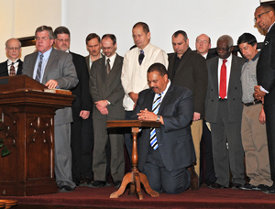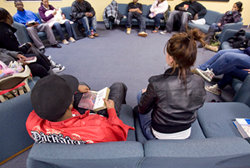"We Shall All Be Changed"

As I sat in the midst of the church council, comprised of at least a dozen gray heads, I was painfully aware that I was only 21 years old. They had asked me to consider being their pastor. That could not have been an easy decision for them, but I was going to ask them to do something much harder: change. As a fledgling separatist I could not join their church’s conference, but it would be simple enough for them to withdraw from it, right?
But they could hardly understand why I would ask such a thing. They had always been conservative and thought that holding to their solid tradition was enough, while the world changed around them.
Today, half a lifetime later, I am a gray head and I am struggling with the concept of change. Is it too late in the course of church history to propose another doctrine? Not so that I can teach it, but so that I can study it, a thorough “Changeology” needs to be developed. I must not be the only one who is longing to know when it is right and best to cut loose of old moorings, and when it is both courageous and wise to hold to the time-tested. Choose your hot-button issue: Bible translations, music, worship formats, personal separation standards, and probably any other you can imagine, the issue is: “to change or not to change?”
In my opinion Leith Anderson makes some good observations but comes to the wrong conclusions in his book Dying for Change, which is perhaps the volume most to the point. He says, “Two theological truths explain God’s relationship to change: immutability and sovereignty.” (11) He rightly notes that change is most often chaotic for man but never is for God. I disagree with some of his suggestions for modernizing the church, because we have different “non-negotiables,” but I appreciate his consistency.

 Reprinted with permission from
Reprinted with permission from  Republished with permission from
Republished with permission from 

Discussion